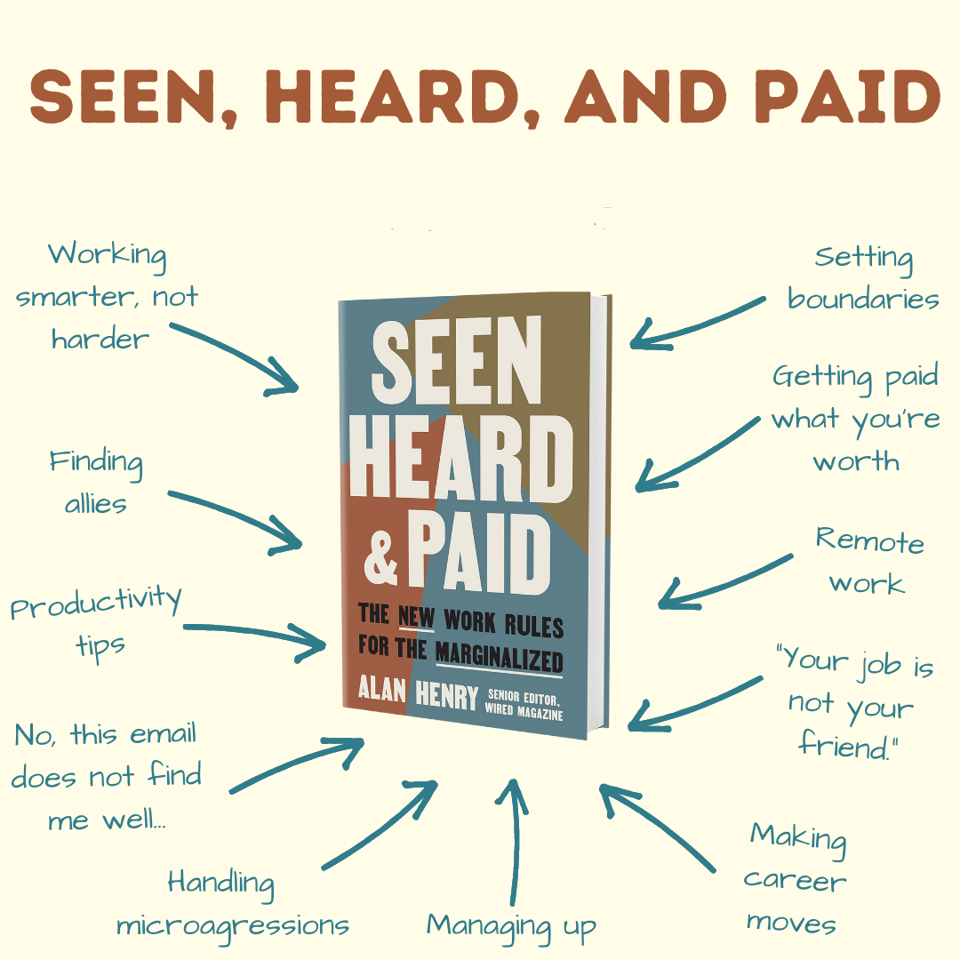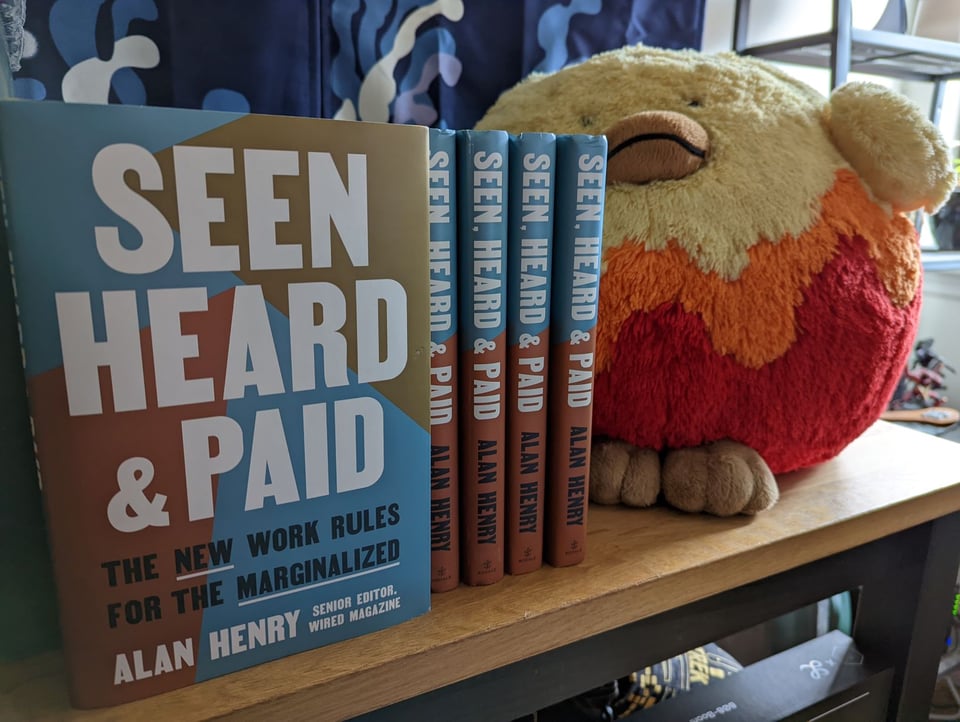Don't Fear Failure.

Welcome back to a slightly off-schedule Productivity, Without Privilege. Suffice to say I’ve been busy, but instead of simply apologizing for the awkward schedule, I’ll lead by saying hello, it’s great to have you, and my name is Alan Henry, your host and MC, reminding you to tip your server, sit back, relax, and enjoy our little salon. Oh, I’m also the author of Seen, Heard, and Paid: The New Work Rules for the Marginalized, which I’ve heard is coming out in paperback soon! When specifically though, I’m not sure, but you all will be the first to find out.
Shall we go ahead and get started? This week’s thesis is simple, and you already know it if you’ve read the title. Don’t fear failure.
I think about this a lot, partially because when I was a child, I got a lot of mixed messaging about failing things. Failure was never an option, but it was never a thing to worry about either. It’s tough to tell a child “it’s okay to make mistakes, as long as you get back up, dust yourself off, and get back to it,” when those mistakes also just happen to have implications beyond their understanding, so you also have to pressure them to succeed and put their best into literally everything that they do.
So when I was a kid, I was told the former, but pressured to act on the latter. Mistakes weren’t things I liked to make, nor were they things I truly considered learning experiences until I got much much older. In fact, it wasn’t until I was in college that I really came to understand the value of just…fucking up sometimes. Not intentionally of course, but the value of taking a risk on something that may or may not pay off. And if it doesn’t pay off, well, as long as other areas of your life are secure, or you at least have the skills or the capability to secure yourself after making said mistake, you’re in a good spot to actually learn from what went wrong.
Of course, that’s all easier said than done, isn’t it?
I’m not going to wax rhapsodic about the importance of making mistakes, that’s been done before in a way I don’t think I have room in this newsletter to mimic, and heck, there’s even a masterclass on the topic (now there’s a lucrative opportunity I hadn’t thought of…) so let me drill down a little. To me, there are two big kinds of mistakes.
The first is the kind of mistake that we know we’ve made, the kind we have to acknowledge somehow. The second is the kind that we don’t know we’re making until it’s made clear to us through some other means.
Let’s tackle the latter first, mostly because I feel like it’s the easiest to overlook. Those are the mistakes where things happen that truly aren’t your fault, or because of you, but somewhere in the leadup you can identify times when, if you’d done something differently, maybe the outcome would be different. If you’re reading this and thinking to yourself “that sounds a lot like regret,” you’re right. But the key difference between learning from your mistakes and having regrets is the desire for the outcome to have been different.
When I left Lifehacker, I was probably the most depressed I had been—or have been—for a long time. I talk about the events that led to that in Seen, Heard, and Paid, and a few weeks ago, when the Labor Department made modes to invalidate non-disparagement clauses and NDAs signed in order to keep severance, I waxed a little on Twitter about those days too, if you’re curious about some of the nonsense I put up with as I watched the company collapse around me, fingers firmly crossed for the success of my friends who remained. (And this isn’t me telling you to go spill the tea on your former employers: I felt safer doing so because the company that forced me to sign said agreement in order to get severance doesn’t actually exist anymore.)
Aside from putting up with a target on my back because I wasn’t one of the cool kids, being denied my Weingarten rights, and so on, I knew that nothing that happened there was my fault, exactly, but I could see some things that I could have done differently in the leadup to those events. Do I wish that moment in my life had happened differently? Well, not really: without being railroaded the way I was, I wouldn’t have landed at The New York Times, or be where I am now, at WIRED. I would never have written Seen, Heard, and Paid. So I don’t regret it.
But I can see where I didn’t stand up for myself when I should have. I can see the times where I should have reached out to my peers for their thoughts more, or when I should have worked harder to protect myself, owned my own success more, or touted my own achievements more. A lot of those missed opportunities turned into advice that I put into the book, but the bottom line is that while I can recognize that what happened as a result had nothing to do with my skills, my talent, and my ability, I can look back and learn something from that experience. And that’s what I’d recommend all of you do as well. Look back at a time when you’ve been wronged, or when you suffered or were laid low by something that absolutely was not your fault. Focus and remember that it wasn’t your fault. That it wasn’t about you, or your capabilities, it was about someone else and their deficiencies. And then look at how you’ve grown past that moment in time and become the person you are today. Look at what you learned, and be proud that you learned those lessons. Look at what you have yet to perfect, and redouble your commitment to yourself. That’s how you learn from mistakes that had nothing to do with you.
Now let’s talk about the first kind of mistake: the kind that you know you made, because it was pointed out to you clearly. Those are the easier ones to learn from, because someone took the time (or maybe were required to take the time) to explain to you what went wrong. They can be kind corrections or rude ones, people who patiently show you how you made the error and how to avoid it in the future, or the kind of people who make the whole experience worse by using your error as leverage over you or an opportunity to ridicule you. In any case, those are the mistakes you know you made, and on some level, I’m sure you’re already driven to learn from.
In those cases, you don’t really need my help, do you? But I would, if I may, recommend that however whatever baggage the correction came with, either drop it and move forward without it—without the pain, anger, frustration, or injustice that came at the same time—or use it as fuel to make sure you never make the same mistake again, and the people you care for don’t either. As they say, the best revenge is to live a good life, isn’t it?
So where does that leave you? I know I talked about myself a lot here, but I hope you can, ironically, learn from my own mistakes as well as your own. Remember to never, ever fear failure. Some journeys will end in cheers and shining lights. Others will end quietly, with sad partings from friends and work that you truly cared about. (Especially in today’s layoff-heavy workplace.) But every journey will end. So do all the things you need to do to protect yourself, try not to blame yourself, and always try to remember to move forward.
Don’t let mistakes hold you back—use them as a waypoint to show you the way forward: not just in terms of what not to do again, but as a signpost to show you whether you’re even on the right path to begin with. And this might be a different newsletter entirely, but don’t be afraid to change course, when you need to.
[ Worth Reading ]
White Women Doing White Supremacy in Nonprofit Culture, by Heather Laine Talley: One painful truth in both DEI and activism circles is that when you look at, at least in the United States, who votes and for whom, and who has been the biggest beneficiaries of diversity initiatives, white women tend to both be the biggest beneficiaries of diversity initiatives but also tend to vote against candidates and initiatives that would fight white supremacy. The reasons for this are myriad, but this piece focusing specifically on nonprofits and charitable organizations caught my eye because it takes an industry-specific look at what that means in organizations dedicated to helping people, and who those organizations end up helping. Talley also discusses what she and her peers can do about it, in a very refreshing way that I’d say is worth sending to other allies who may find themselves in similar situations.
Despite DEI promises, media companies are still mostly hiring white people, by Sara Guaglione: And now for the other end of the spectrum. Perhaps you, like me, remember that “great reckoning with race” that media companies and journalism as a whole was supposed to have had back in 2020 and how there was so much talk, promise of action, dollars committed to diversity initiatives. Well, a few years have passed, and sure enough, as any person of color in media could probably have told you, the results haven’t added up to the promises. In many cases, and in many newsrooms, there hasn’t even been tangible progress (don’t get me started on how publications handle their diversity reports through a combination of HR and PR, and frame their stats to look like they’re making progress but omit things like retention or career advancement so they look good externally while the story internally is…different.)
Educators and Publishers Are Fighting the Right’s Attempt to Erase Black History, by Eleanor J. Bader: But there is some good news around these parts: at least there’s been some concerted pushback against this trend of removing books and changing curriculum to avoid making little Timmy sad when he finds out that white privilege is real and he benefits from it. It really does feel like all the news is bad while libraries are being shut down because the librarians refuse to bend the truth or pull books that include any minority group, from queer people to people of color, from their shelves. But spare a thought or two to the brave librarians and administrators who are pushing back on the trend at every school board meeting, every city or county council meeting, and trying desperately to speak truth to Fox-pilled conspiracy theorists.
[ See You, Space Cowboy ]

I know it’s been a long time coming, but I’ve finally drawn the winners of the book giveaway! I’ll be in touch with all of you individually shortly (I promise! I just need to go get some mailers and email you to let you know that the book is on the way!)
So that all said, congratulations to Jack, Jennifer, Stephanie, Juwan, Heather, Denise, Ivan, Anders, Jac, and Kevin! I’ll be in touch as soon as your books are dedicated and ready to ship.
Thanks so much to everyone who entered, and most importantly, thank you all for helping me clear out some of my author copies. My living room, my office, my huge Squishable phoenix named Sriracha, and I both thank you.
I’ll see you back here soon.